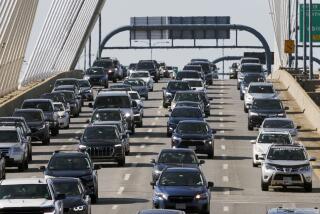Carmakers Allowed to Supply Own Crash Data
- Share via
ARLINGTON, Va. — The Insurance Institute for Highway Safety said Thursday that it had altered a part of its crash test program, allowing manufacturers of top-rated vehicles to provide crash test data that can be verified by the institute before it issues a score.
The change affects its frontal offset crash test, which evaluates a vehicle traveling 40 mph and striking a barrier on the driver’s side.
Along with test results released by the National Highway Traffic Safety Administration, the institute’s information is used by consumers to assess a vehicle’s safety value.
The institute said the move would free up more time and resources to devote to side-impact crash tests and additional research on crash avoidance technologies.
Adrian Lund, the institute’s president, said the decision reflected the progress made by automakers in providing greater frontal protection. When the institute started conducting frontal tests in 1995, about half the vehicles it tested were rated either “marginal” or “poor,” the lowest of the four marks.
Among its current batch of frontal results, most of the vehicles are rated “good,” the top score; only two vehicles are rated “marginal” and none received the lowest mark.
To ensure quality, Lund said, the institute will conduct periodic audits of vehicles, comparing the test data from the automakers with an institute crash test.
In its first frontal ratings involving verification of the automakers’ test data, nine 2006 models received a “good” rating: Buick Lucerne, Cadillac DTS, Hyundai Azera, Toyota RAV4, Honda Pilot, Ford Explorer, Mercury Mountaineer, Mercedes M Class and Dodge Ram 1500. The 2007 models of the Ford Explorer Sport Trac and Toyota Camry were rated “good,” and the 2006 Chevrolet Impala was rated “acceptable.”






